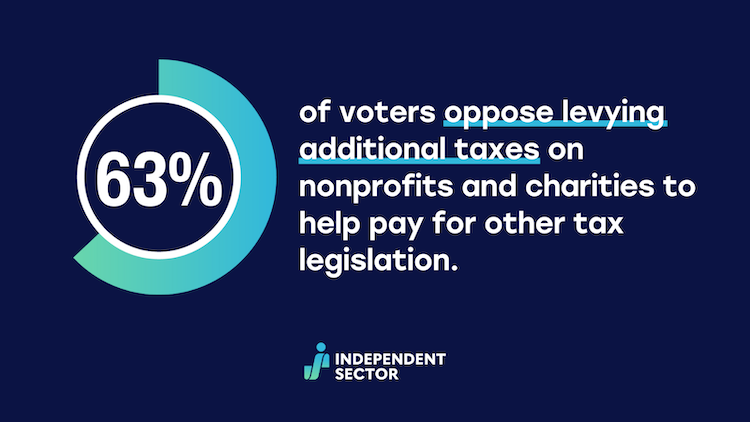
Nonprofits play a vital role in the U.S. economy, with 501 (c)(3) organizations alone accounting for 12.8 million jobs. Associations support 1 million jobs.
When Convene spoke with Tommy Goodwin, vice president of Exhibitions & Conferences Alliances (ECA), before Donald Trump took office in January, he identified a number of ways the events industry could be affected by the Trump administration’s policies. Among them: changes to tax laws. ECA, Goodwin told us, is keeping a watchful eye on potential alteration to the tax-exempt status of nonprofit associations and their events, given that this sector of the industry drives $42 billion in spending annually nationwide and results in $35.1 billion in federal, state, and local annual tax revenue.
“PCMA’s Convening Leaders, edUcon, all the revenue from that, there’s no tax on it,” Goodwin said. “There are quite a few people in Washington, D.C., who would like to change that. That could be potentially devastating to the association side of the event space.”
ECA isn’t the only organization concerned about how this change in the tax structure could have a devastating impact on associations: Independent Sector is a national membership organization representing a diverse community of nonprofits, foundations, and corporate-giving programs. On Feb. 18, the organization released the results of a public poll it conducted among nearly 1,400 registered voters nationwide on a wide range of topics related to nonprofits and public policy — including the growing threat nonprofits face from tax proposals. “Washington policymakers and other D.C. influencers are evaluating various revenue-generating strategies for 2025, with some proposals targeting tax-exempt organizations and the status of 501(c) nonprofits,” according to the press release announcing the poll results. “There is rising concern over suggestions that nonprofits should be subjected to new taxes, which would significantly weaken the sector’s ability to serve communities across 50 states.”
Nonprofits play a vital role in the U.S. economy, with 501 (c)(3) organizations alone accounting for 12.8 million jobs, Independent Sector noted. Additionally, associations directly support more than 1 million jobs nationwide.
While the “legislative outlook may be murky on Capitol Hill,” Independent Sector writes, “there is no confusion in the minds of voters. Voters overwhelmingly want to see nonprofits better resourced through charitable giving and federal tax credits, a strong nonprofit workforce, and nonprofit engagement in policy work to address community needs.”
Among the poll results: More than six in 10 voters (63 percent) oppose levying additional taxes on nonprofits and charities to help pay for other tax legislation — a position held by a majority of Trump (58 percent) and Harris (67 percent) voters.
 Moreover, trust in nonprofits remains high. Eight in 10 voters (81 percent) trust nonprofits to engage in policy work that cuts through the mess of politics and serves their community in a nonpartisan way. And more than half (54 percent) said they were more likely to volunteer with nonprofits that provide resources to help them reach out to lawmakers on issues they care about. A stat from the U.S. Census Bureau and AmeriCorps supports the value Americans place on nonprofits: Between 2022 and 2023, nearly 76 million people volunteered at nonprofits, serving an estimated nearly 5 billion hours, valued at $167 billion.
Moreover, trust in nonprofits remains high. Eight in 10 voters (81 percent) trust nonprofits to engage in policy work that cuts through the mess of politics and serves their community in a nonpartisan way. And more than half (54 percent) said they were more likely to volunteer with nonprofits that provide resources to help them reach out to lawmakers on issues they care about. A stat from the U.S. Census Bureau and AmeriCorps supports the value Americans place on nonprofits: Between 2022 and 2023, nearly 76 million people volunteered at nonprofits, serving an estimated nearly 5 billion hours, valued at $167 billion.
The newly launched Community Impact Coalition — a national group formed this year to represent the nonprofit community in light of the potential to become the target of tax reform — categorized nonprofit organizations at risk: trade and professional associations are among animal welfare and humanitarian groups, disaster relief organizations, faith-based organizations, patient advocacy and disease research organizations, poverty and hunger relief groups, and veterans groups.
“This is a pivotal moment to take stock of how much Americans value nonprofits — especially as the tax-exempt sector faces unprecedented threats from policymakers and think tanks,” said Steve Caldeira, president and CEO of the Household & Commercial Products Association and co-chair of the Community Impact Coalition. “As Congress considers raising revenue by revoking tax-exempt status, it must recognize what the public already understands and appreciates: Nonprofits strengthen communities by providing essential services where government and for-profit businesses cannot or will not.”
Michelle Russell is editor in chief of Convene.
